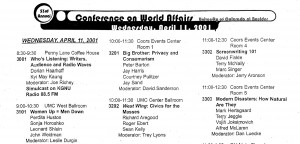Roger & Me
In a recent article, University of Denver political scientist Seth Masket claims that the Netflix series “House of Cards” is “the worst show about American Politics. Ever” After elaborating his list of grievances about the show, Masket proclaims: “…if you want to understand American politics, watch just about anything else.”
In 2001 I was invited to participate in the World Affairs Conference at the University of Colorado. The WAC is unique in several regards. Participants are assigned to panels with minimal regard for their expertise. Sessions are valuable for the ability of the panelists to provoke passions, and promote vigorous discussion with the audience. For decades, the World Affairs Conference has attracted prominent individuals who pay their own way to Boulder for the week. Attendees are not paid. This year the Conference celebrates its 67th year.
Among the half-dozen panels scheduled for me was one titled: “The West Wing: Civics for the Masses.” The panel was scheduled for one of the largest rooms at the conference; at least 400-600 people were there, and there was not an open seat in the house.
But they were not there to hear me speak.

On stage I was joined by Richard Aregood, a Pulitzer Prize winner, and then-Editor of the opinion page of the Philadelphia Daily News; and Roger Ebert, also a Pulitzer Prize winner, and nationally-renowned movie critic for the Chicago Sun-Times. For many years Ebert attended the conference, paying his own way, and spending four days deconstructing a movie that he selected, on a first-come-first-seated basis. The sessions were always packed.
As it turns out, the organizers chose the right panelists for a discussion of The West Wing. Aregood admitted to having seen one episode; Ebert none. Upon hearing of my upcoming conference, my then-student John Celock recorded some episodes on video tape for me to watch. I managed to watch three episodes; two more than my Pulitzer-winning compatriots, and three more than I could stand.
My conclusion: It was the worst depiction of American politics I had ever seen. From the lionization of the presidency, to the utter contempt of the West Wing staff for Congress, there was nothing about the show that was a “civics lesson.” And I told the audience.
They did not like it. Not one bit.
What I failed to realize, in retrospect, was that there was not a question mark at the end and of the panel title. It was a declarative statement: West Wing was, in fact, a civics lesson, and the 400 people in the audience would not accept any other conclusion.
Ebert, of course, was far more savvy than the professor from Niagara University. Noting my disdain for the show, and the audience’s displeasure with my critique of it, he remembered for them the letters he received from archaeologists complaining about the inaccuracies in “Indiana Jones.” One should never listen to the criticisms of an expert, he told them. And then, as the love of the audience swelled for him, he promised them that, based on their deep love for the show, he would go back an watch every episode of The West Wing.
The applause was thunderous.
For 90 minutes I was Roger Ebert’s foil. The loved him, and hated me (at least it seemed that way). It was as good as it could get. I loved being the foil. Especially in Boulder.
To this day I have seen only three episodes of The West Wing. I have seen every episode of House of Cards. For my love of Kevin Spacey I choose to remember Roger Ebert, and suspend disbelief. House of Cards is an atrocious depiction of American politics, but great Shakespearean drama.
It is a wonderful piece of art. That was Roger Ebert’s point.
If one is interested in a more real-to-life depiction of American politics in action, I suggest a show from 2003 titled Mister Sterling. Starring Josh Brolin as an appointed Senator from California, this “modern day Mr. Smith goes to Washington” captures quite a few of the details about American politics more accurately than House of Cards or the West Wing.
Then again, it lasted for only 10 episodes and is now long forgotten. Politics and great art do not necessarily go together. Just ask the ghost of Richard III.
